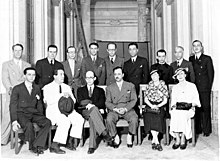Alceu Amoroso Lima

Alceu Amoroso Lima (born December 11, 1893 in Rio de Janeiro , † August 14, 1983 in Petrópolis ) was a Brazilian writer , literary critic and politician . He wrote under the pseudonym Tristão de Ataíde .
Life
Alceu Amoroso Lima studied law in Rio de Janeiro. After graduating in 1913, he traveled to France. After returning to Brazil, he worked as a literary critic and took his pseudonym. By Jackson de Figueiredo and P. Leonel Franca S.J. influenced, he converted to the Catholic Church in 1928 and, after de Figueiredo's death, headed the Centro Dom Vital , a meeting place for the country's Catholic intellectuals. In 1932 he founded the Catholic Electoral League together with Plinio Corrêa de Oliveira and Heitor da Silva Costa with the support of Cardinal Archbishop Sebastião Leme da Silveira Cintra . Later, influenced by Jacques Maritain , he changed his political course. On August 29, 1935, he was elected to the Academia Brasileira de Letras , a literary academy modeled on the Académie française . From 1935 to 1945 he was President of the Brazilian Catholic Action . From 1941 to 1963 he was a lecturer at the Pontifícia Universidade Católica do Rio de Janeiro (German Pontifical University of Rio de Janeiro) for Brazilian literature. During the military government he campaigned for freedom of expression and freedom of the press.
Works (selection)
- Estudos - Segunda série (1927)
- Politica (1932)
- Elementos de ação católica (1938)
- Mitos de nosso tempo (1943)
- O problema do trabalho (1946)
- Meditações sobre o mundo interior (1953)
- O existencialismo e outros mitos de nosso tempo (1951)
- O gigantismo econômico (1962)
- O humanismo ameaçado (1965)
- Os direitos do homem eo homem sem direitos (1975)
- Revolução Suicida (1977)
- Tudo é mistério (1983)
Web links
| personal data | |
|---|---|
| SURNAME | Lima, Alceu Amoroso |
| ALTERNATIVE NAMES | Ataíde, Tristão de (pseudonym) |
| BRIEF DESCRIPTION | Brazilian writer, literary critic and politician |
| DATE OF BIRTH | December 11, 1893 |
| PLACE OF BIRTH | Rio de Janeiro |
| DATE OF DEATH | August 14, 1983 |
| Place of death | Petrópolis |